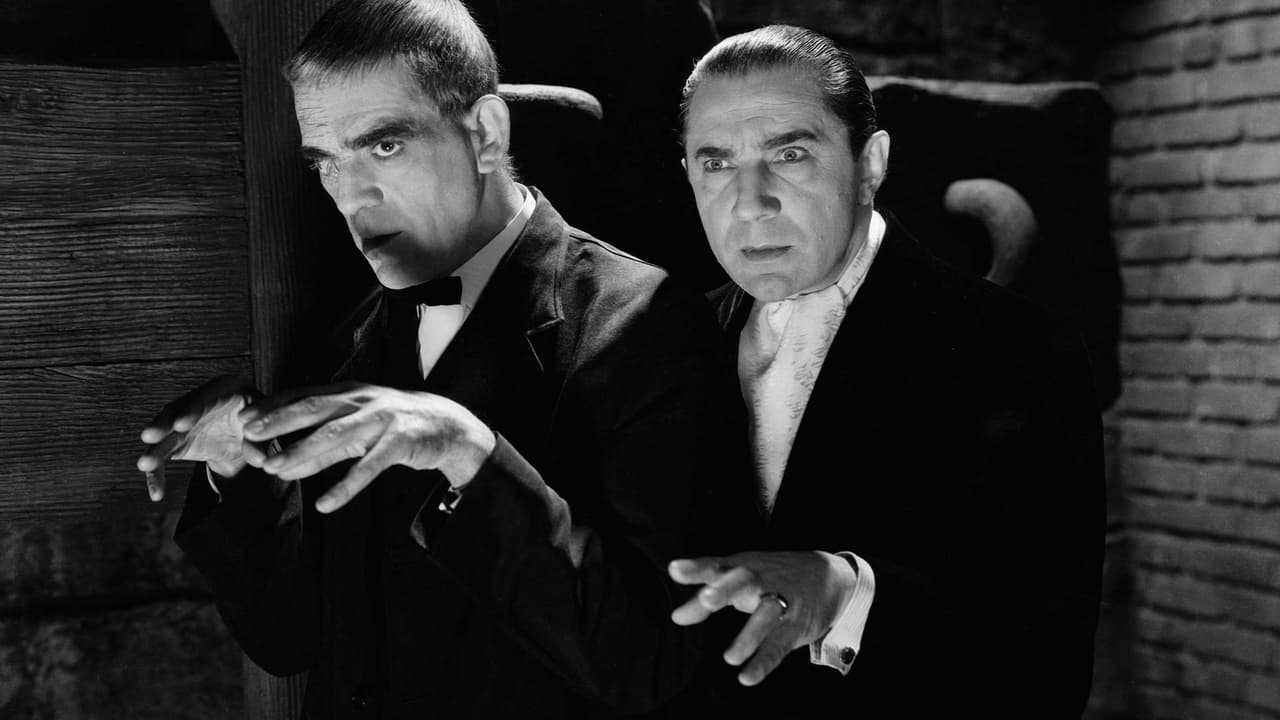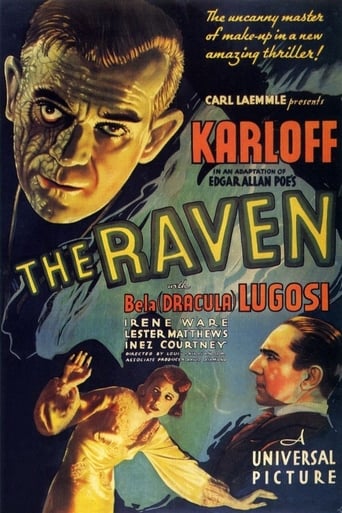

The 1930's were in my opinion was the greatest decade for horror movies & The Raven is one of the best of that period. Karloff is excellent as always but it's Lugosi who steals the show in arguably his best ever performance. The rest of the cast are good too & the sets play a key part in this Universal classic. I started off watching the old b&w horror movies when I was a kid, 30 odd years ago. Since then many are no longer as scary or effective as they felt when I first saw them. This is an exception.
... View MoreAfter saving a beautiful dancer's life at the bequest of her distraught father, the eccentric, Poe-quoting doctor who successfully performed the girl's surgery finds himself smitten with his lovely patient; the young woman's father fears the feeling might be mutual and disapproves. Meanwhile, a gangster begs the doctor for a new face--and gets one, but not the handsome mug he had hoped for; the doctor makes a deal to fix the botched surgery if the gangster carries out his plan for the murder of the girl's father. Grab-bag thriller from Universal gives both Bela Lugosi and Boris Karloff (top-billed as Karloff) deliciously creepy roles, but perhaps it was the multitude of uncredited writers on this project that helped to stall the story's momentum. Initially, Lugosi is obsessed with the girl--and she's enchanted by him--but soon, she's back with her boring fiancé and Lugosi wants to kill them both. The wealthy fools who gather at Lugosi's mansion on a dark, stormy night are very funny, and Karloff is sympathetic as the strong-arm who doesn't want to kill anymore, but the story quickly stops paralleling Poe and instead becomes a routine house of horrors (although the elevated bedroom is a nice touch). ** from ****
... View MoreThe Black Cat was the biggest hit of 1934 for Universal and so they brought Karloff and Lugosi back to star in The Raven. This time the roles are reversed as Lugosi plays Dr. Richard Vollin, an insane surgeon obsessed with the writings of Edgar Allen Poe, while Karloff plays Edmond Bateman, a criminal who Vollin tricks into doing his bidding.Once again the two main actors are fantastic in their own ways. Karloff plays of his silent approach and uses his very soft spoken voice to make us feel sorry for the disfigured Bateman. Lugosi meanwhile is having a ball as the mad Dr. Vollin, giving one of his best performances and having one of the craziest, sinister laughs in cinema history.The plot is a lot tighter than The Black Cat but it still suffers from the fact the other actors don't, or simply don't try, to measure up to Lugosi and Karloff. These guys are giving some of the best performances of their careers while the other actors simply blend in to the background much of the time.Its a good thing that just like Edgar G. Ulmer in The Black Cat, Lew Landers presents some fantastic sets, especially the recreation of a famous Poe torture device. His use of The Raven is much like that of the cat in The Black Cat in that its a passive mention of evil, whereas the raven is a symbol of Death. Landers, like Ulmer, also has a good eye for the use of shadow using it to give Vollins torture chamber a horrifyingly realistic look.Overall, The Raven is a great follow up to The Black Cat for both Karloff and Lugosi, once again giving great performances and at only an hour long, easily viewable right after the hour long The Black Cat.
... View More"The Raven" sees horror legends Bela Lugosi and Boris Karloff, who had both achieved star-status four years earlier as Dracula and Frankenstein's monster respectively, sharing a billing for the second time after the previous year's classic "The Black Cat". However, while on paper "The Raven" and "The Black Cat" share key similarities (both star Lugosi and Karloff, both are inspired by the morbid works of American writer Edgar Allen Poe, and both films even share a similar trapped-in-house-of-death plot) the latter feature has none of the eccentricities, suspense, or depth which characterized the earlier film and, as a result, I found "The Raven" uninspired, uninspiring, and really un-scary.The final part of a trilogy of (really loosely) Poe-based films, beginning with "Murders in the Rue Morgue" (1932), "The Raven" has Lugosi playing Dr. Richard Vollin, a brilliant ex-surgeon who is lured out of his research to save the life of beautiful dancer Jean (Irene Ware) who he then falls madly in love with. However, she is already engaged and his desire turns to obsession and then to insanity as he hatches a plan involving Bateman (Karloff), a wanted criminal that literally knocks at Vollin's door who he facially disfigures and enlists to help him deal with those that got in the way of his love for Jean with the help of a dungeon full of Poe-inspired torture devices.The film's main problem is the total lack of suspense which, despite its 60 minute run time, seems to drag. I put this down to the characterizations which have the charismatic Vollin dominating the broadly ineffectual and pitiable Bateman (harking back to Karloff's role in Whale's "The Old, Dark, House" (1932)) in contrast to "The Black Cat" where the characters were equally matched in a bitter game of death. In addition, Lugosi's performance starts off as creepy and menacing in the Dracula mould but as the film goes on his hysterical madman's laughter is exaggerated and campy like Kenneth Williams in horror-spoof "Carry on Screaming". Add to this the dull sets (apart from the mirror room reveal scene) which, again, seem woefully dull compared to the cold, futurist masterpiece set design of "The Black Cat", and we have a movie struggling to keep its head above water.Maybe it's unfair to keep referring to "The Black Cat" in a review of "The Raven", but I think that, considering all the elements that the films share, the comparison is unavoidable. And as a result, with the first film being a classic, it was always going to be hard to come out from its shadow. Saying this, I still think that even without the comparisons to "The Black Cat" running through my head the whole film, "The Raven" still wouldn't quite cut it.
... View More